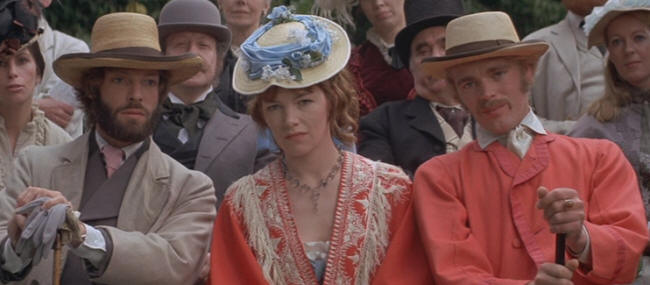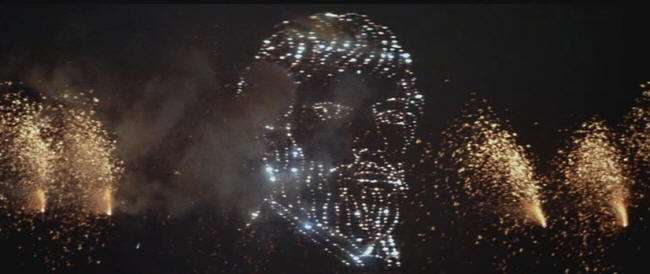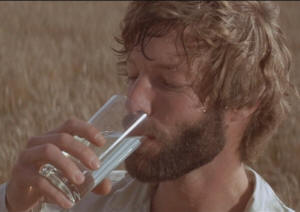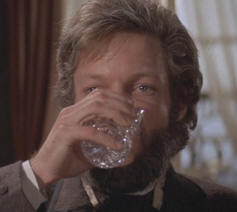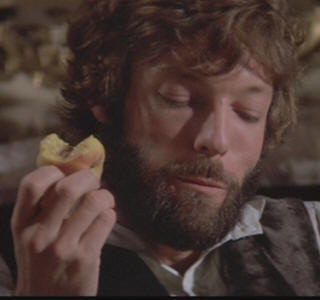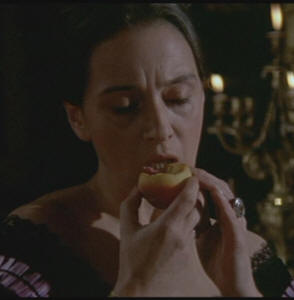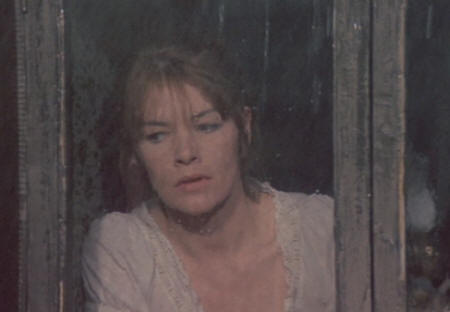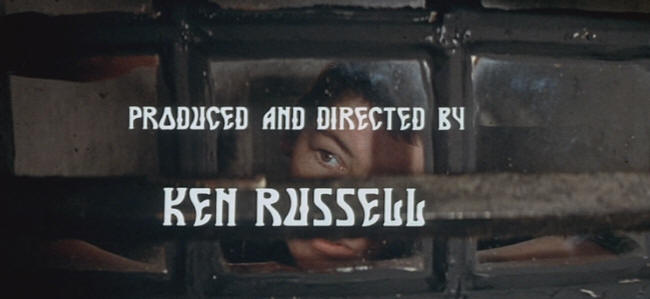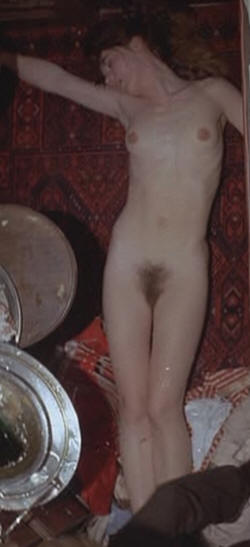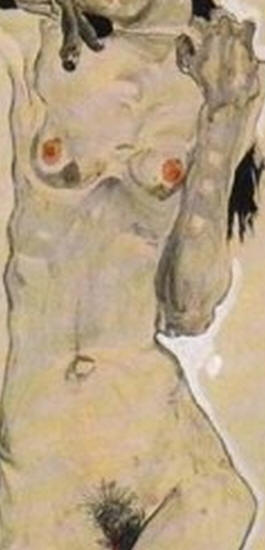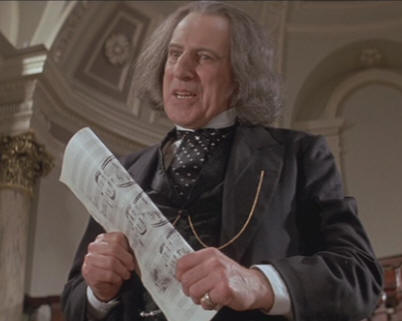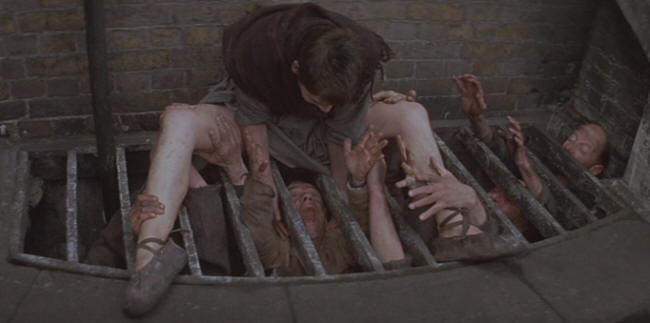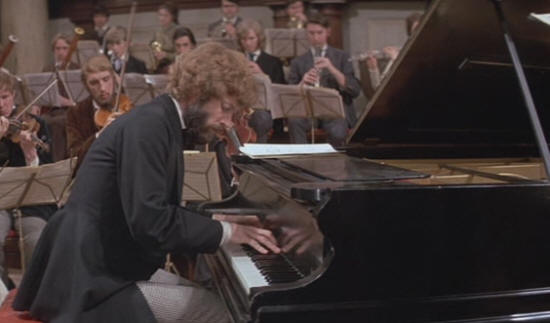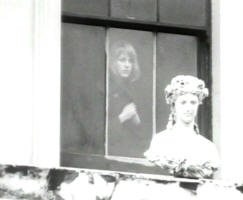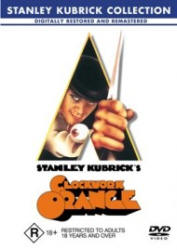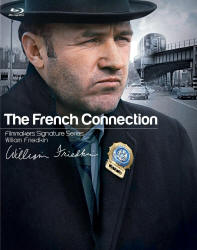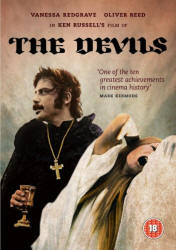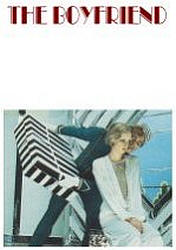|
The Music Lovers from 1971, Ken Russell's famous quote "If I hadn't told United Artists it was a film about a homosexual who fell in love with a nymphomaniac it might never have been financed". Not simply a biography of Tchaikovsky, but also looking at the people around Tchaikovsky, the music lovers though few of whom love the music. Tchaikovsky cannot handle the contradictions in his life and turns his haunted thoughts into music. The music lovers drag Tchaikovsky down to their own fantasies. The film cost £1.6M. Scholes talks of Tchaikovsky's melodic vein, brilliant orchestral colour, and strong emotional expression [just like Russell] and on Tchaikovsky "His life includes some curious incidents, as, for instance, a marriage followed by a separation after only eleven weeks, his strange relationship with the wealthy widow, Nadezhda von Meck, whom he never once met (though they once passed in the street), yet who was for years his best friend, freeing him to devote himself to composition by the grant of a yearly allowance and entertaining him hospitably (in her absence) in her country estate" (The Oxford Companion to Music, Percy A. Scholes 10th edition edited by John Owen Ward).
Tchaikovsky, his wife Nina and his unwelcome gay lover. Tchaikovsky realised his marriage to Nina was a sham "At first I thought that I would fall in love with a girl who was so sincerely devoted to me... The instant the ceremony was over and I found myself alone with my wife, realising that our fate was henceforth to live inseparably and together, I knew suddenly that I felt for her not even simple friendship, but that she was abhorrent to me in the full sense of the word" (Tchaikovsky letter to von Meck, 9 Aug 1877 from Beloved Friend by Catherine Drinker Bowen and Barbara von Meck).
The film is packed with images and excitement, the life story providing a common link. Music, gay forbidden love, a mother dying of cholera, a sponsor who never wants to meet Tchaikovsky and who suddenly ended the sponsorship, critical failure and death by cholera, just like his mother. The script makes use of von Meck's book “Modeste found his brother up and dressed early, sitting at tea with the score of the symphony in his hands. He was trying to think of a name for it… merely Number 6 did not seem sufficient… Modeste suggested the word “tragic”, but Peter shook his head and Modeste went out the room, leaving him brother frowning indecisively. Suddenly Modeste reappeared at the door, “Pathetique!” he called out. “Perfect, Modia!” cried Peter, “Bravo! Pathetique.” (von Meck letter, 24 Aug 1893 from Beloved Friend by Catherine Drinker Bowen and Barbara von Meck).
The drink of life, in a dream sequence early in the film, and death by cholera from infected water at the end.
Tchaikovsky and Madame von Eck tasting the juices of the same peach. They would never meet though she would fantasise over him.
Initially Nina looks to an uncertain future, and as the end credits roll, she has no future as she looks through the window bars of a mental asylum.
The working titles were The Lonely Heart (from a Tchaikovsky song None but a Lonely Heart) and Opus 74 (the number of the symphony Pathétique). I saw the film when it came out in Edinburgh. I saw it on Wednesday and before it had moved on (Saturday) I had seen it another three times. My introduction to Ken Russell. Ronald Hayman in The Times, 6 Jan 1971, quotes Ken as saying "I think I want to explain something about the people through their art. I think people are explainable even in an oblique or almost undecipherable way by what they produce. It's them, whatever they say their reason is for doing it. I don't want to explain the music, but what I enjoy about it is the detective story.". Hayman discusses the film "for someone who is so interested in biography, Russell is oddly uninterested in the passage of time. His Tchaikovsky is still a young man when he dies and no-one would think that 18 years had passed since the first Piano Concerto."
The famous scene of unrequited sex on the train shows the influence of painter Egon Schiele (right). "I remember filming that scene distinctly. The railway carriage set was rocked backwards and forwards, and luggage fell out of the racks on top of me. I can still hear Ken saying: “Oh, she’s fine. She’s not bruised. Come on, get her up.” There were about three separate minor accidents, all of which were treated not as doing harm to me, but a delay to the actual making of the film" (Glenda Jackson interviewed by Rich Pelley, The Guardian, 16 Jun 2022, click here). The music is performed by Andre Previn conducting the London Symphony Orchestra, with pianist Rafael Orozco. The music includes:
John Russell Taylor's review on 24 Feb 1971 in The Times is titled "Russell's pathetic fallacy". He says "Mr Russell sets out to out-melodramatise Tchaikovsky at his most melodramatic." Roger Ebert assesment leads him to something which is far removed from a review "Ken Russell is a most deviously baroque director, sucking us down with him into his ornate fantasies of decadent interior decoration, until every fringe on every curtain has a fringe of its own, and the characters have fringes, too, and the characters elbow their way through a grotesque jungle of candlesticks, potted plant stands, incense sticks, old champagne bottles, and gilt edges, and it is almost certain that something is happening in the movie. But what?" (1 Jan 1971, from RogerEbert.com click here).
Igor Toronyilalic shows more undestanding in his review "The Music
Lovers is so beautifully shot (Douglas Slocombe), so cleverly
choreographed (Terry Gilbert), so conscientiously art-directed
(Natasha Kroll), gets so often to such an unbearably potent truth (if
not the truth) and argues so good-naturedly and tenderly for the most
sweet-heartedly sentimental gloss on Tchaikovsky's music that I was
intermittently swept clean off my feet and sent out into the night
with goosebumps. To give an example of biased criticism of Ken Russell see the Wikipedia entry. It quotes Time Out New York on The Music Lovers "vulgar, excessive, melodramatic and self-indulgent . . ." (Wikipedia, accessed 3 May 2023, click here).
The "..." cuts out some words. The original reads "vulgar, excessive, melodramatic and self-indulgent: Tchaikovsky's music is indeed all of these things, yet gloriously so, and the same goes for Ken Russell at his freewheeling best" (TJ, Time Out, 10 September 2012, click here).
This is shoddy misrepresentation of the review by TJ, of Tchaikovsky
and of Ken Russell. |

